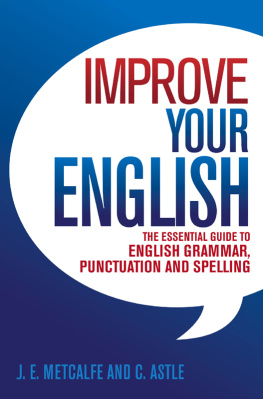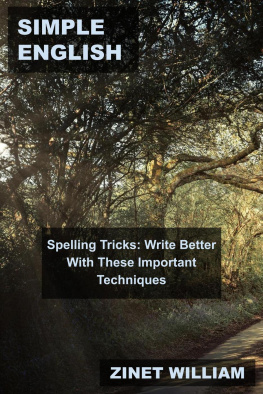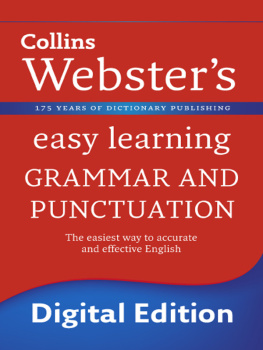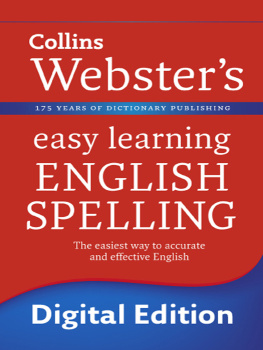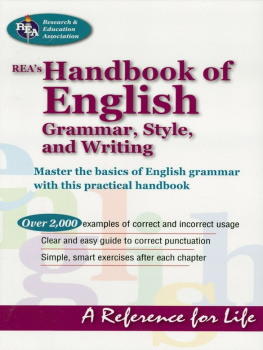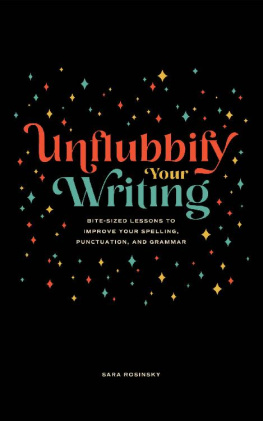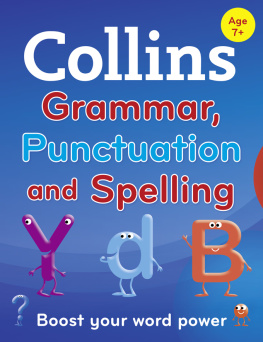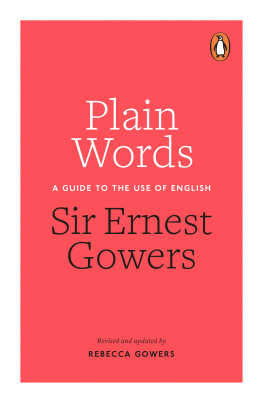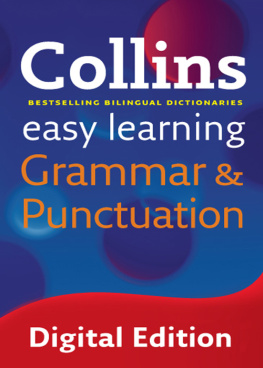IMPROVE
YOUR ENGLISH
IMPROVE
YOUR ENGLISH
THE ESSENTIAL GUIDE
TO ENGLISH GRAMMAR,
PUNCTUATION AND SPELLING
J E Metcalfe and C Astle

Constable & Robinson Ltd
5556 Russell Square
London
WC1B 4HP
www.constablerobinson.com
First published by Right Way, an imprint of Constable & Robinson, 2013
Copyright J E Metcalfe and C Astle 2013
Originally published in the title Correct English in 1995, material having been drawn from The Right Way to Improve Your English, How Good is Your English? and The Right Way to Spell.
All rights reserved. This book is sold subject to the condition that it shall not, by way of trade or otherwise, be lent, re-sold, hired out or otherwise circulated in any form of binding or cover other than that in which it is published and without a similar condition including this condition being imposed on the subsequent purchaser.
A copy of the British Library Cataloguing in Publication Data
is available from the British Library
ISBN: 978-0-7160-2345-6
eISBN: 978-0-7160-2346-3
Printed and bound in the EU
1 3 5 7 9 10 8 6 4 2
Cover design: www.simonlevyassociates.co.uk
CONTENTS
THE ENGLISH LANGUAGE
The supremacy of English as a world language is a relic of the age when Great Britain was an important world power. The inhabitants of the huge chunks of territory which in old atlases were coloured pink enjoyed the benefits of learning English from explorers, travellers, missionaries and settlers. It is rather remarkable that today, despite minor idiomatic and spelling differences, American custom, an infinity of verbal differences, and diverse political constitutions, there is general consistency in written English throughout the world.
Speech, of course, is far, far older than writing, and the development of the written language from the spoken in different parts of the world is an absorbing subject. The symbols of language, formed to represent objects, actions or syllables of speech, developed, in time, into characters which could be combined to form words. The first language to be written was Sumerian, which began as simple pictures and which can be traced as far back as 3100 BC.
The Canaanites are said to have developed the first alphabet in the middle of the second millennium BC. The convenience of this method of writing led to its adoption by other Semitic peoples and the ancient Greeks, and, while each nation developed its own, the scripts were all based on Canaanite characters. Today there are Hebrew, Greek, Cyrillic, Arabic and Latin alphabets, besides the bewilderingly vast range of characters of the Far East (China and Japan). The Latin or Roman alphabet, now the most widely used in the world, is a derivative of archaic Greek script. The word alphabet is so named from the first two letters of the Greek alphabet, alpha and beta, which in turn were named after the first two signs of the Phoenician alphabet aleph and beth. Also derived from the Greek alphabet is Cyrillic script, used in Russia, Bulgaria and some Balkan states, originally by members of the Orthodox Church, and called after St Cyril who died in AD 869.
With Julius Caesars incursions into Britain in 55 and 54 BC, the native Britons perhaps picked up a few Latin expressions and words but, unlike the invaders, they knew nothing about writing. What happened, then, to the only real British languages which existed before the Romans came? These languages, themselves derived from even older forms of speech, were the original Celtic tongues, which, most remarkably, had little effect on the development of English. Today they survive in Gaelic, Irish, Welsh, Manx and Cornish, but not in English, despite the fact that English is a mixture of several languages.
It was probably not until the beginning of the real Roman occupation, about a hundred years after Julius Caesar, that the Roman alphabet was introduced into Britain. For a few centuries writing was practised only by monks and other scholars, being chiefly for ecclesiastical and legal documents and in Latin. We read so much today that it is difficult to imagine a time when hardly anybody did any reading. For centuries people passed their time in other ways; perhaps they conversed far more than they do now, and stories would be told by travelling storytellers and bards. Even kings and other leaders had to employ scribes. Monks busied themselves in writing original works or copying others in beautiful manuscript, but ordinary people did not need to read them, even if they could.
The development of English took place over a very long time, during which most of the people in Britain were quite content with the spoken language, based on the speech of the sixth-century Anglo-Saxon invaders. Latin persisted, later invaders from Scandinavia brought much of their language, and the Norman Conquest of 1066 brought French. By the thirteenth century three languages were in use Latin for scholars, ecclesiastics, philosophers and lawyers, French for the aristocracy, and English for the rest.
The schools began teaching English about 1300 and English was at last permissible in the law courts in 1362. Gradually the various languages mingled, and Geoffrey Chaucers Canterbury Tales, for example, probably written after 1373, was written in an attractive mixture of English and French. Chaucer has been accused of using too many French words as an affectation, but French was certainly more elegant, more melodious, than the written and spoken English of the time. Chaucer was not alone in trying to improve the language, and the following passage, written in 1385, not only shows the awareness of sensitive people to the imperfections of English but is an example of the extraordinary written language of the period:
As it is knowe how meny maner peple beeth in this lond; there beeth also so many dyvers longages and tongs. Notheless Walsche men and Scots that beeth nought medled with other nations, holdeth wel nyh hir firste longage and speche;... but the Flemynges that woneth in the west side of Wales, having left her strange spech, and speketh sexonliche now. Also Englishe men, they had from the bygynnynge thre maner speche: northerns, sowtherne, and middel speche in the middel of the londe, as they come of three maner of peple of Germania: notheless by commyxtion and mellynge first with Danes, and afterwards with Normans, in meny the contrary longage is apayred [corrupted].... All the longage of the Northumbers, and specialliche at York, is so scharp, flitting and frotynge, and unschape, that we southerne men may that langage unethe understonde.
The Canterbury Tales shows that in Chaucers time (c. 13451400) Southern English consisted of Anglo-Saxon and Old French. The philosophers and scientists introduced a number of Greek and Arabic words, while the musicians and artists gave us some Italian and Dutch. Later, explorers and their men brought words from the East, from India, China and Malaya.
The English language is thus a hotch-potch of other languages, and the gradual changes have divided its history into three chronological periods known as Old English, Middle English and Modern English. The Old English period is considered to have ended about 1150 and the Middle English period about 1500, since when Modern English has been enriched by countless influences and additions from many other languages to become the English of today.
The rules of Modern English have evolved from the speakers of the language through custom, usage and logic, even if at times the logic appears to be curious. There has been an urge, especially important in law, to distinguish between shades of meaning. There has been a wish to avoid tiresome queries and explanations between two persons in conversation. There has been anxiety to express much in little. There has been, above all, the unconscious human desire for orderliness, for that certain kind of discipline which has embraced the other desirable qualities of communication in our language writing and reading.

